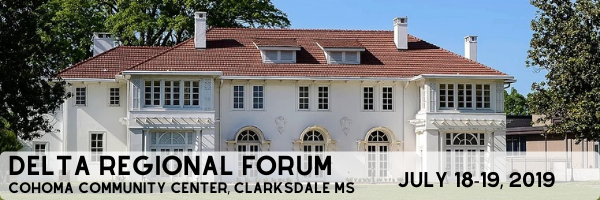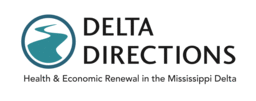Paper Presentations 2: Environment, Health, and Wellness
Location
Lewis 301
Start Date
18-7-2019 2:45 PM
End Date
18-7-2019 4:00 PM
Description
Moderator: Stephanie Showalter Otts, University of Mississippi
Applying the Ecosystem Services Framework to Leverage Capital Investment and Improve Stakeholder Engagement in the Mississippi Alluvial Valley and Black Belt of the Southeastern United States
Mark Dugo, Mississippi Valley State University
Ecosystem services are benefits to society afforded by our surrounding environment. We introduce-propose a logical stepwise model for intervention that hinges on the ecosystem services framework to address persistent poverty among predominantly African American rural populations situated in the Mississippi River Alluvial Valley (i.e. the Delta) and the Black Belt of the Southeastern United States (SE US) and to improve African American stakeholder engagement in contemporary environmental issues. In ecological terms, the Alluvial Valley and Black Belt of the SE US are also situated in one of the most biologically diverse regions in the country. The model we introduce emphasizes the relationships between values, identity, and interest to foster a deeper connection to the environment (i.e. environmental stakeholder awareness and engagement). This model is proposed as a viable tool to leverage capital investment as a form of reparations for rural African American communities in the SE US.
Green Spaces and their Ecosystem Services as a Means to Improve Public Health in Mississippi
Marlon Flowers, Mississippi Valley State University
Mark Dugo, Mississippi Valley State University
For public health to improve equally across the socioeconomic spectrum, environmental quality must be equal regardless of socioeconomic position. This study investigates the intersection of the spatial distribution of green spaces across the urban landscape in Greenwood, Mississippi (located in the Mississippi Delta) and potential environmental justice issues. Our approach includes: 1) the implementation of pre- and post-intervention surveys assessing the public’s awareness of green spaces and their associated ecosystem services (i.e. provisioning, regulating, supporting, and cultural), known to improve the quality of life among frequent users within proximal communities; 2) a comparative assessment of parks in Greenwood using a Public Open Space Tool (POST); and 3) the implementation of the EPA’s EJSCREEN tool to identify potential environmental justice issues in the immediate vicinity of parks located in Greenwood. We advocate for equity in the spatial distribution of high-quality green spaces and the ecosystem services they provide.
An Interdisciplinary Approach to Community Engaged Research and Environmental Health Policy Surrounding Lead in Drinking Water in the Mississippi Delta
Stephanie Showalter Otts, University of Mississippi
Kristie Willett, University of Mississippi
John J. Green, University of Mississippi
This study entailed community-based research (CBR) to assess drinking water and empower participants to make changes to reduce lead exposure. Operating within the Mississippi Delta, partners worked with local leaders to engage their constituencies through outreach and water sampling events. Methods were evaluated using both quantitative and qualitative analyses. Sociodemographic data were correlated with Census tract data, allowing us to identify at-risk areas. Recruited through community events, 216 households had their water analyzed for pH and lead, representing a 70% return rate. Detectable lead concentrations were found in 65.7% (n = 142) of samples ranging from 0.06 to 14.3 ppb, with the highest concentrations from a well-owner event. Nine samples exceeded 5 ppb, and these residences received certified sink filters. CBR can fill data gaps around lead in drinking water, but choice of engagement strategy is critical. This project contributed to risk assessment and guided scalable research and outreach efforts.
College2Youth: Design of Interdisciplinary Undergraduate Research Experience
Georgianna Mann, University of Mississippi
Timmi Unger Bishop, University of Mississippi
Kimberly Kaiser, University of Mississippi
Annie Cafer, University of Mississippi
This pilot research program, College2Youth, was developed to train undergraduate students in community-based participatory research through the lens of middle school student health behaviors and school programming to create a healthier environment. College2Youth is an undergraduate research training program led by sociology, criminal justice, and nutrition instructors. Researchers (n=6) enrolled in three credit hours of independent study completed literature reviews on school wellness and received relevant research training in fall of 2018. After training, researchers conducted focus groups with students in a Mississippi Delta middle school to determine perceived barriers to wellness. Researchers returned to the middle school and proposed three feasible initiatives where researchers asked adolescents for open-ended constructive feedback in focus groups. College2Youth is a strategic interdisciplinary method to train undergraduates in research while supporting involvement in diverse surrounding communities. This is an adaptable model that can be used to create a rich community-based interdisciplinary undergraduate research experience.
Relational Format
Conference Proceeding
Recommended Citation
Dugo, Mark; Flowers, Marlon; Otts, Stephanie Showalter; Willet, Kristie; Green, John J.; Mann, Georgianna; Bishop, Timmi Unger; Kaiser, Kimberly; and Cafer, Annie, "Paper Presentations 2: Environment, Health, and Wellness" (2019). Delta Regional Forum. 16.
https://egrove.olemiss.edu/dr_forum/2019/Schedule/16
Paper Presentations 2: Environment, Health, and Wellness
Lewis 301
Moderator: Stephanie Showalter Otts, University of Mississippi
Applying the Ecosystem Services Framework to Leverage Capital Investment and Improve Stakeholder Engagement in the Mississippi Alluvial Valley and Black Belt of the Southeastern United States
Mark Dugo, Mississippi Valley State University
Ecosystem services are benefits to society afforded by our surrounding environment. We introduce-propose a logical stepwise model for intervention that hinges on the ecosystem services framework to address persistent poverty among predominantly African American rural populations situated in the Mississippi River Alluvial Valley (i.e. the Delta) and the Black Belt of the Southeastern United States (SE US) and to improve African American stakeholder engagement in contemporary environmental issues. In ecological terms, the Alluvial Valley and Black Belt of the SE US are also situated in one of the most biologically diverse regions in the country. The model we introduce emphasizes the relationships between values, identity, and interest to foster a deeper connection to the environment (i.e. environmental stakeholder awareness and engagement). This model is proposed as a viable tool to leverage capital investment as a form of reparations for rural African American communities in the SE US.
Green Spaces and their Ecosystem Services as a Means to Improve Public Health in Mississippi
Marlon Flowers, Mississippi Valley State University
Mark Dugo, Mississippi Valley State University
For public health to improve equally across the socioeconomic spectrum, environmental quality must be equal regardless of socioeconomic position. This study investigates the intersection of the spatial distribution of green spaces across the urban landscape in Greenwood, Mississippi (located in the Mississippi Delta) and potential environmental justice issues. Our approach includes: 1) the implementation of pre- and post-intervention surveys assessing the public’s awareness of green spaces and their associated ecosystem services (i.e. provisioning, regulating, supporting, and cultural), known to improve the quality of life among frequent users within proximal communities; 2) a comparative assessment of parks in Greenwood using a Public Open Space Tool (POST); and 3) the implementation of the EPA’s EJSCREEN tool to identify potential environmental justice issues in the immediate vicinity of parks located in Greenwood. We advocate for equity in the spatial distribution of high-quality green spaces and the ecosystem services they provide.
An Interdisciplinary Approach to Community Engaged Research and Environmental Health Policy Surrounding Lead in Drinking Water in the Mississippi Delta
Stephanie Showalter Otts, University of Mississippi
Kristie Willett, University of Mississippi
John J. Green, University of Mississippi
This study entailed community-based research (CBR) to assess drinking water and empower participants to make changes to reduce lead exposure. Operating within the Mississippi Delta, partners worked with local leaders to engage their constituencies through outreach and water sampling events. Methods were evaluated using both quantitative and qualitative analyses. Sociodemographic data were correlated with Census tract data, allowing us to identify at-risk areas. Recruited through community events, 216 households had their water analyzed for pH and lead, representing a 70% return rate. Detectable lead concentrations were found in 65.7% (n = 142) of samples ranging from 0.06 to 14.3 ppb, with the highest concentrations from a well-owner event. Nine samples exceeded 5 ppb, and these residences received certified sink filters. CBR can fill data gaps around lead in drinking water, but choice of engagement strategy is critical. This project contributed to risk assessment and guided scalable research and outreach efforts.
College2Youth: Design of Interdisciplinary Undergraduate Research Experience
Georgianna Mann, University of Mississippi
Timmi Unger Bishop, University of Mississippi
Kimberly Kaiser, University of Mississippi
Annie Cafer, University of Mississippi
This pilot research program, College2Youth, was developed to train undergraduate students in community-based participatory research through the lens of middle school student health behaviors and school programming to create a healthier environment. College2Youth is an undergraduate research training program led by sociology, criminal justice, and nutrition instructors. Researchers (n=6) enrolled in three credit hours of independent study completed literature reviews on school wellness and received relevant research training in fall of 2018. After training, researchers conducted focus groups with students in a Mississippi Delta middle school to determine perceived barriers to wellness. Researchers returned to the middle school and proposed three feasible initiatives where researchers asked adolescents for open-ended constructive feedback in focus groups. College2Youth is a strategic interdisciplinary method to train undergraduates in research while supporting involvement in diverse surrounding communities. This is an adaptable model that can be used to create a rich community-based interdisciplinary undergraduate research experience.



